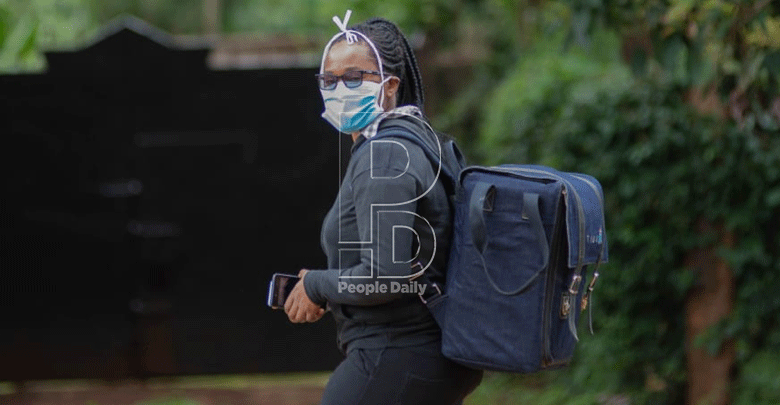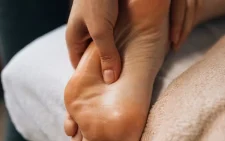App brings hospital to your home

Harriet James @harriet86jim
While working on a joint Amref Health and University of British Columbia faculty of medicine project in northern Kenya, Jason Carmichael, a public health guru in statistics and an epidemiologist, noticed a number of healthcare workers didn’t have a full time jobs due to lack of opportunities.
“I also noticed they weren’t too pleased with opportunities available,” says Jason.
Being that he was already in the sector that leverages technology for health solutions, he had an idea of using mobile phones in providing opportunities to healthcare workers and increasing access to health services.
All he had to do was to ensure services delivered were convenient, safe and would strictly adhere to World Health Organisation standards.
Together with Peter Gikera, a software engineer, they created Tibu, an app that connects patients to healthcare professionals or health care services.
They also have two more co-founders : Dr. Hanane who is in charge of the medical department is the chief operating officer Shiro Theuri is in charge of the technical bit.
Instead of patients seeking medical attention in clinics and hospitals, the app connects them to healthcare practitioners who come directly to their homes.
Peter now deals with the technical aspects of the app and Jason handles the administrative part. The app took two and a half years to be completed.
“We launched the tech company in March last year just with the onset of Covid-19, which was a complete coincidence.
A few of our business partners were a bit concerned, but we used the opportunity to make strategic partnerships with big companies such as the Lancet and Amref Health, which will assist in leveraging the platform,” says Jason.
Now the chief executive officer and co-founder of Tibu Health, Jason says launching the app during the pandemic was a great opportunity as more services went online.
Vetting process
“People have appreciated having quality healthcare services delivered at home or places of work rather than going to hospitals where they are worried about being exposed to the disease or pathogens. They stay home and are safe,” he says.
One can reach the doctors by downloading the app or calling the customer support. The maximum time you can wait for a healthcare worker to attend to you is 30 minutes.
Compared to the hospital prices, it is cheaper by 40 per cent. For instance, one pays Sh2,500 for consultation and Sh6,500 for a Covid-19 tests.
The healthcare workers pass through a vigorous vetting process, which takes two weeks before they can be incorporated as part of the team.
One needs to have a minimum of two years of hands-on practice and all valid licenses and registrations with appropriate boards. They must have professional liabilities cover.
“We have learnt it’s common for healthcare workers to lack personal professional indemnity cover, especially lab technicians and nurses.
So, we have worked with insurance companies to create those types of policies to make it safer and protect the healthcare space,” adds Jason.
Once all that is verified, the doctor will undergo a tough interview process and if successful, undergo training on how to use the app, the medical kits and how to deliver care in someone’s home.
“A different level of professionalism is required when you enter people’s homes or offices compared to being in the hospital.
For instance, we train them on what protocol to use when knocking the door, how to greet people they meet, how to deal with a child running around while they are working with the parent. All the small things must be taken into consideration,” he says.
Jason says the service is more personalised compared to the hospital.
“We will still check on the patient and find out how they are doing even after the visit.
We realised most patients are not used to this and for us it’s standard to give a very different medical experience,” he adds.
Over 3,000 individuals have downloaded the app in Nairobi so far and they have done over 6,000 interactions between health professionals and patients since launch.
However, even with the success, there are challenges they have to grapple, one of which is logistics.
“We need to ensure bookings and logistics are seamless to make operations as efficient as possible.
You can’t be sending a healthcare worker from Westlands to Embakasi as there is traffic, which makes it time consuming to get there,” he explains.
The startup plans to have a number of deployment hubs in the coming months to make their work efficient. Another challenge that they face is lack of awareness.
“Most people have been taught over time that the hospital is the only place one can get cured so our challenge is changing this 200-year of ingrained behaviour and making people see they can get 70 to 80 per cent done at home,” Jason adds.
Reinventing systems
In addition, they plan to introduce imaging services that would for example enable them conduct home-based ultra sounds for expectant mothers.
“There will always be the need for hospitals, but they will have to reinvent themselves or part of their businesses will become irrelevant, especially if we focus on prevention and early detection. We have to stop people from just reacting when they feel sick,” he notes.
When it comes to data safety, Jason assures the public that all of their protocols are compliant to data privacy and protection laws such as the Data Protection Act, 2019.
“It took quite some time to build the apps and we involved a number of lawyers before getting it right.
The client is the only person with access to their records as its encrypted in and out,” he says.
Funding is also another challenge and instead of having people from the outside finance projects in Africa, Jason believes that Kenyans can support their own.
“There are a lot of Kenyan startups with great ideas, but are struggling. We need our people to see that the future is tech and for them to be interested in investing in the small startups.
It doesn’t have to be big money, but when they do, their money will be a 10 times return,” he observes.












